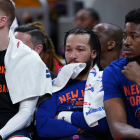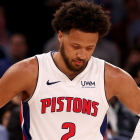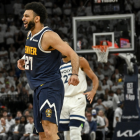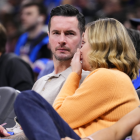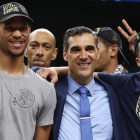It was March of 2017, and the Detroit Pistons were tied for the last playoff spot in the Eastern Conference with 12 games to play. Before facing the Brooklyn Nets at Barclays Center, Pistons president and coach Stan Van Gundy took a question about their decision not to trade upcoming free agent Aron Baynes before the deadline.
The whole league knew Detroit was unlikely to re-sign Baynes after the season, and Van Gundy said management did talk about the possibility of moving him. Ultimately, the Pistons decided that Baynes was "a vital part of what we're doing," and so they kept him for their playoff chase.
"That's another thing with pro sports: Everything can't always be about next year," Van Gundy said. "You know? The present does matter."
Detroit lost to the lowly Nets that night on a Brook Lopez buzzer-beater, and it lost its next four games after that. The Pistons finished the season 37-45, 10th in the East and four games out of the playoffs. Baynes signed with the Boston Celtics in the summer.
In hindsight, it is easy to say that Van Gundy's front office should have dumped Baynes for even a second-round pick. Any kind of return is better than losing a player for nothing. The entire Detroit organization -- from owner Tom Gores on down -- desperately wanted that playoff spot, though, and the team was strikingly better with Baynes on the court than with him on the bench.
This is the part of the column where I explain why the Pistons' decision not to trade a backup center last season is relevant today. On Monday, Van Gundy and the franchise parted ways, an outcome he said he was prepared to accept a couple of months ago because "this business is about winning games, and we haven't been doing enough of that."
That is a diplomatic way of explaining how Detroit got to this point -- a more precise way of putting it is that the team continually prioritized moderate success in the short term over long-term championship contention and, in the process, wound up with neither. Keeping Baynes for a playoff run that never materialized is a microcosm of Van Gundy's four-year tenure.
When Gores hired Van Gundy, the Pistons had missed the playoffs for five straight seasons and had only reached the 30-win mark in one of them. The idea was for Van Gundy to bring them back to relevance in short order, without completely mortgaging the future. Van Gundy said it in the press release announcing his hiring: "It is an honor to be chosen to help Tom Gores build the Pistons into a team that competes for championships. Tom's vision of building for the future, while seeking immediate improvement is a challenge that I embrace."
It is also the toughest thing for any franchise to do.
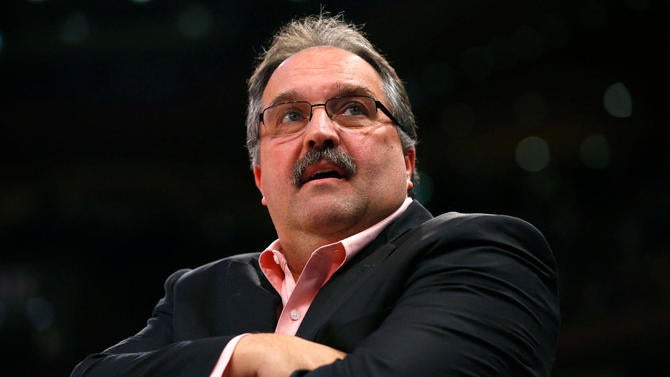
There is no foolproof way to build a championship contender in the NBA. Every path has a low probability of success and inherent risks. Gores and Van Gundy decided not to bottom out and tank to get a superstar, but to try to build around center Andre Drummond and make opportunistic trades and signings. The risks were obvious: If Drummond didn't turn out to be a true franchise player, it would be incredibly difficult to find another one. And if Detroit failed to allocate its resources or had bad injury luck, it would be incredibly easy to find itself locked into a core with a low ceiling.
To the Pistons' credit, they tried to execute this strategy in sensible ways. While they were never going to undergo a full-on youth movement, they acquired players approaching their prime and didn't bother with old dudes on the downside of their careers. They decisively won a couple of trades (for Reggie Jackson and Tobias Harris) and took a few calculated risks that didn't pay off for them, like signing Boban Marjanovic and drafting Spencer Dinwiddie. For the most part, though, their downfall was that they kept investing significant money in merely competent role players.
It isn't quite fair to destroy Van Gundy for signing guys like Jodie Meeks, Baynes, Ish Smith, Jon Leuer and Langston Galloway over the past few seasons. They're all fine role players, and his mandate was to find players who fit next to Jackson and Drummond. Jackson kept getting injured, though, and while Drummond made major strides on offense this season, the big man is still far from the dominant paint protector he has the potential to be. In this context, with Detroit still the outside of the playoff picture, its cap sheet looks awful, especially with the enormous Blake Griffin contract on the books.
About the Griffin trade: As shortsighted as it may have seemed, ESPN's Zach Lowe reported on Monday that the decision to acquire him was not some last-ditch effort for Van Gundy to save his job. The Pistons' brain trust made that decision collectively. Again, the entire franchise has been in win-now mode during the Van Gundy era, and all of their decisions should be viewed through that prism.
The argument here, is not necessarily that Detroit should have gone full Process and spent the last few years chasing lottery balls. It is that chasing respectability is an even more dangerous game. In order to be anything more than mediocre, your hits need to be much bigger than signing Anthony Tolliver and Reggie Bullock to bargain deals. Usually you need to strike gold somewhere on the margins, like, say, drafting a star outside of the top 10. (Last June, Van Gundy's front office took Luke Kennard No. 12, one spot before the Jazz selected Donovan Mitchell.)
Four seasons after Van Gundy's arrival, the Pistons' roster is indisputably better than it was but there is no clear path to contention. Whoever takes over will inherit an awkward assortment of players without the financial flexibility to fix their problems easily. Is that all Van Gundy's fault, though, or is the root of the problem that the owner handed him a team with Drummond, Greg Monroe and Josh Smith sharing the frontcourt and told him to win quickly? I wonder what Gores will ask Van Gundy's replacements to do.














